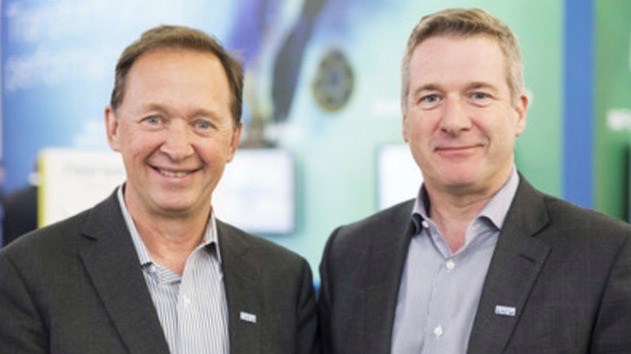
EXFO founder and Executive Chairman Germain Lamonde (left) with CEO Philippe Morin
- EXFO’s going private
- Open RAN operators detail tech requirements
- Analyst house talks up mmWave potential in Europe
- Orange buys into African digital healthcare specialist
A ‘going-private’ move by EXFO’s founder, more detailed Open RAN requirements from Europe’s major operators and the case for mmWave in Europe lead the way in today’s industry news roundup.
Test, assurance and analytics systems vendor EXFO is being taken private by its founder and Executive Chairman, Germain Lamonde, who has set up an acquisition company that is paying US$6.00 per share to acquire all the stock he doesn’t already own. The move, which values EXFO at $336 million, sent EXFO’s share price soaring by more than 60% to $5.93. "This transaction is in the best interests of all of EXFO's stakeholders," said Lamonde, who added that the deal would ensure “the long-term success of EXFO as a private company for its employees, business partners and all the other stakeholders. My objective is to continue working with our talented management team and employees globally to further develop what has become a successful global Test and System provider while maintaining its headquarters in Québec City." The company recently reported fiscal first half revenues of $140.8 million, up by 9.2% year-on-year, and adjusted earnings of $13.4 million. Lamonde was EXFO’s CEO for 30 years before handing the reins to optical industry veteran Philippe Morin in 2017. For the full details of the ‘going-private’ transaction, see this announcement.
Following the publication last month of their Open RAN technical requirements white paper, the quintet of European operators that have signed the Memorandum of Understanding (MoU) on The Implementation of Open RAN Based Networks In Europe – Deutsche Telekom, Orange, Telefónica, TIM (Telecom Italia) and Vodafone – have issued a detailed spreadsheet document that provides a “comprehensive list of technical requirements that the signatories of the Open RAN MoU consider priorities for Open RAN architecture.” The spreadsheet can be downloaded from this O-RAN Alliance page. The publication of the document comes less than a week after Vodafone provided details of a successful 5G Open RAN trial that included the use of a RAN Intelligent Controller (RIC) platform running functions from different partners. (See Vodafone boasts 5G Open RAN milestone with RIC evaluation.)
Consulting and research house Analysys Mason has concluded there is “a significant net economic benefit to deploying 5G mmWave primarily together with 3.5GHz and other existing mobile spectrum in Europe, but also standalone, across a wide range of scenarios for outdoor or indoor coverage.” The findings are based on the results of a study commissioned by Ericsson and Qualcomm into the potential benefits of 26 GHz cell deployments across 30 European markets. “This study demonstrates the importance for European regulators to complete 5G licensing in all of the bands identified at an EU level,” noted Janette Stewart, Partner at Analysys Mason. For further details, and to download the report, titled 'Status, costs and benefits of 5G 26GHz deployments in Europe', which was produced by Analysys Mason’s consulting team, see this announcement.
Orange Middle East and Africa and insurance giant AXA have jointly acquired a majority stake in DabaDoc, which has developed a platform that offers digital access to healthcare services in Africa. “DabaDoc has developed solutions that are used by thousands of healthcare professionals in Morocco, Tunisia and Algeria. Orange and AXA’s investment and network will accelerate DabaDoc’s growth and extend DabaDoc’s services to other regions, in particular Sub-Saharan Africa,” notes Orange in this announcement.
Today saw the launch of e-scooter rental trials in London. Five boroughs will test out the viability of electric powered e-scooter hire as a business model just as e-mobility is hitting a bright stretch in the wake of the pandemic, according to keen observers of the e-transport scene. One such is David Parry-Jones, Senior Vice-President for Twilio in EMEA, who claims the wider tech industry is benefitting from the e-mobility boom via innovations in software and the IoT tech that is powering pilots. One potential barrier to the e-mobility models is getting hold of SIMs fast enough to manufacture connected vehicles, and the ability to ensure reliable connectivity so devices can stay in use, he says. Obviously, Twilio’s Super SIM (IoT SIMs connected to Twilio’s Super Network) are coming to the rescue here, according to Parry Jones. Without it, he says, Lime, one of the scooter trialists, would have to grapple with multiple SIMs and operator billing relationships, making its operations complicated and expensive. Instead Lime uses one universal IoT SIM, so it can easily control network coverage, availability and costs.
TIM (Telecom Italia) has launched a satellite broadband service trial for customers that cannot be reached by fibre or fixed wireless access (FWA) connections. The operator says the service, which boasts downstream speeds of up to 100 Mbit/s, is delivered by Eutelsat’s Konnect satellite, in an exclusive deal for the Italian market. Read more.
The beautiful UK city of Bath is home to CityFibre’s latest wholesale broadband network rollout, with the £25 million project set to reach almost every home and business by 2023. Read more.
Nigeria’s telcos have been ordered to block user access to Twitter after the social media giant deleted a tweet by President Muhammadu Buhari because it was deemed to have breached Twitter’s rules, reports the BBC. The decision prompted the Nigerian government to suspend Twitter’s operations in Nigeria, a country with about 200 million mobile connections.
A new report from Juniper Research has found that sales of iPhones will generate sales of more $200 billion in 2022, nearly 40% of the total smartphone hardware market, despite representing less than 20% of devices sold that year. Read more.
Data centre operator Equinix has been celebrating its ranking in the list of Fortune 500 companies in this blog.
Email Newsletters
Sign up to receive TelecomTV's top news and videos, plus exclusive subscriber-only content direct to your inbox.




